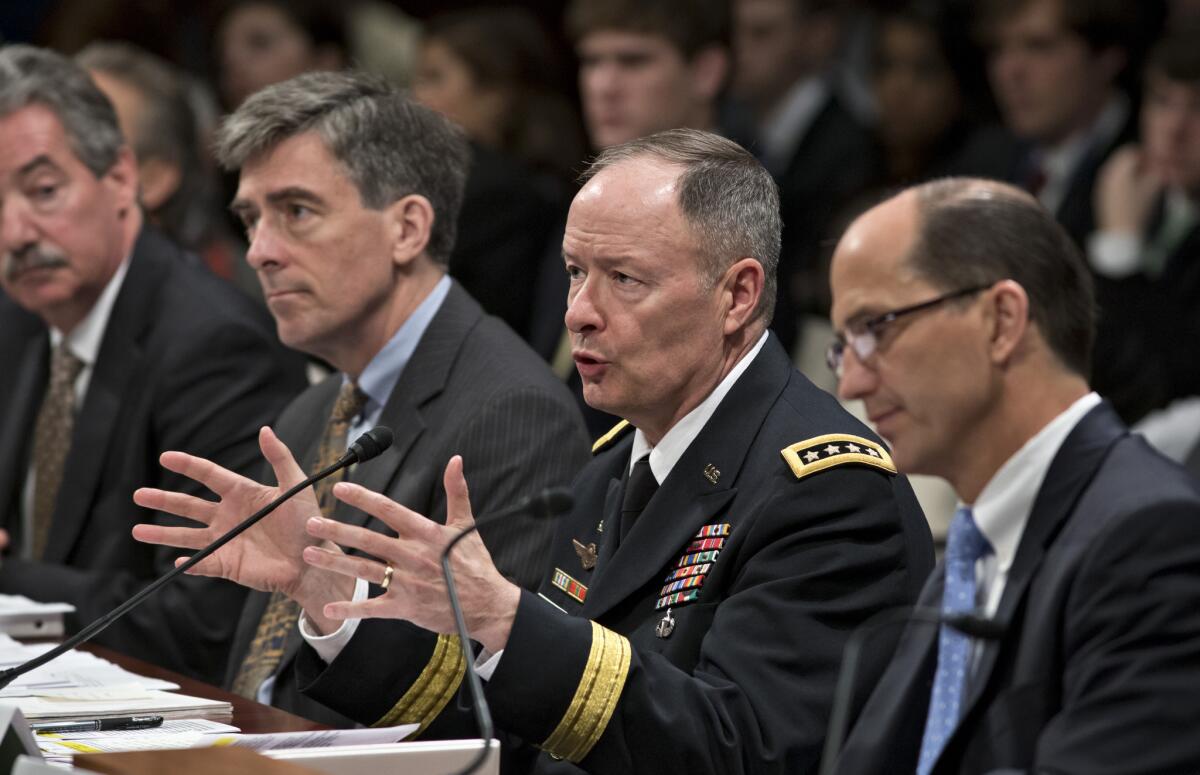A worthy debate on leaks

Even as he condemned Edward Snowden’s leaks about two government surveillance programs, President Obama said he welcomed the debate about whether post-9/11 efforts to detect terrorist plots have undermined Americans’ privacy. That debate has raged since the Guardian and the Washington Post published material provided by Snowden, and two things are clear:
• The American public and many members of Congress were unaware of the scope of the government’s electronic surveillance programs, which include a continuous and indiscriminate collection of the phone records of virtually every American, and extensive monitoring of foreigners’ emails and social media accounts.
• Congress, the courts and the executive branch need to recalibrate the balance between liberty and security. The broad outlines of that new terrorism surveillance policy should be a matter of public record.
VIDEO: Big tech companies and what they know about you
Considerable ink has been expended on the question of whether Snowden, a former government contractor and CIA employee, is a true whistle-blower. As Obama and other defenders of the National Security Agency have pointed out, the activities he has exposed are being carried out pursuant to acts of Congress and under the supervision (however indulgent) of a federal court. But even if Snowden didn’t uncover illegal activity, he disclosed details that should have figured in public and congressional debate about those laws.
It was clear before Snowden’s disclosures that the USA Patriot Act gave the government broad authority to obtain “business records” (including telephone records) so long as it could persuade a court that the material was “relevant” to a terrorism investigation. But Snowden’s revelations made it clear that the law was being used to acquire such “metadata” on a blanket basis, without any connection to a particular investigation, so that the data could be mined later for patterns that might assist in the apprehension of terrorists. (Never mind that James R. Clapper, the director of national intelligence, answered, “No sir … not wittingly,” when Sen. Ron Wyden (D-Ore.) asked him in March whether the NSA collected data on millions or hundreds of millions of Americans.)
Likewise, it was public knowledge that Congress in 2008 and again in 2012 authorized the government to spy on the electronic communications of foreigners reasonably believed to be outside the United States, pursuant to broad orders from the Foreign Intelligence Surveillance Court. It also was known that in the process, the communications of Americans were being “incidentally” obtained and that procedures existed by which that material was to be “minimized” (deleted or disguised). But as a result of Snowden’s revelations about the so-called PRISM program, the scope of such surveillance is now better understood. Last week, the Guardian and the Washington Post published documents outlining procedures for minimizing information about Americans, which confirm that investigators may hold on to information about Americans if it contains “foreign intelligence information” or evidence of a crime.
CARTOON: NSA surveillance program is one of many Big Brothers watching
In recent days, government officials — including Gen. Keith B. Alexander, the NSA director — have appeared before Congress to explain the surveillance programs and argue that they have been instrumental in disrupting terrorist plots. It shouldn’t have taken a leak for such a dialogue to occur.
We hope Snowden’s revelations also will provide impetus for the enactment of safeguards Congress failed to approve in the past. One would be a requirement that the government offer an annual accounting of how many communications involving Americans are caught up in the monitoring of foreign emails and Internet content. Another would be a mandate for the unsealing of opinions by the Foreign Intelligence Surveillance Court (redacted to protect sensitive details) so that the public, Congress and legal scholars could assess the court’s legal reasoning.
Finally, Congress and the federal courts need to scrutinize the collection of telephone “metadata.” Defenders of that program emphasize that investigators “query” the storehouse of information only when they have a reasonable suspicion that such an exercise will establish connections between a phone number in the database and a possible terrorist plot. Even then, investigators must obtain a warrant to examine the content of an American’s phone calls. But despite those safeguards, Americans are understandably uneasy about the fact that information about whom they call, and when, is being vacuumed up and stored by the same government that can audit their tax returns and put them in prison.
In his testimony before the House Intelligence Committee, Alexander told Rep. Adam Schiff (D-Burbank) that the agency would consider an alternative system in which telecommunications companies would retain metadata and the government would review it only when there was suspicion of a foreign terrorist connection. If the NSA doesn’t make that change on its own, Congress should consider requiring it to do so. Meanwhile, the federal courts should be willing to rule on whether the metadata program violates the Constitution. The American Civil Liberties Union has filed a lawsuit alleging that the program violates federal law and the 4th and 1st Amendments. The Supreme Court dismissed an earlier lawsuit involving surveillance programs because the plaintiffs couldn’t prove that their conversations were in fact monitored. But, thanks to Snowden, the ACLU can confidently assert that its telephone records were caught in the government’s dragnet. It is a subscriber of the Verizon subsidiary that turned over records to the government under a court order revealed by Snowden.
Better late than never, Congress and the public are asking searching questions about how the war on terrorism is affecting Americans’ privacy — and the government is beginning to provide detailed answers. Whatever one thinks of Snowden or his motives, his disclosures brought us to this moment.
More to Read
A cure for the common opinion
Get thought-provoking perspectives with our weekly newsletter.
You may occasionally receive promotional content from the Los Angeles Times.






